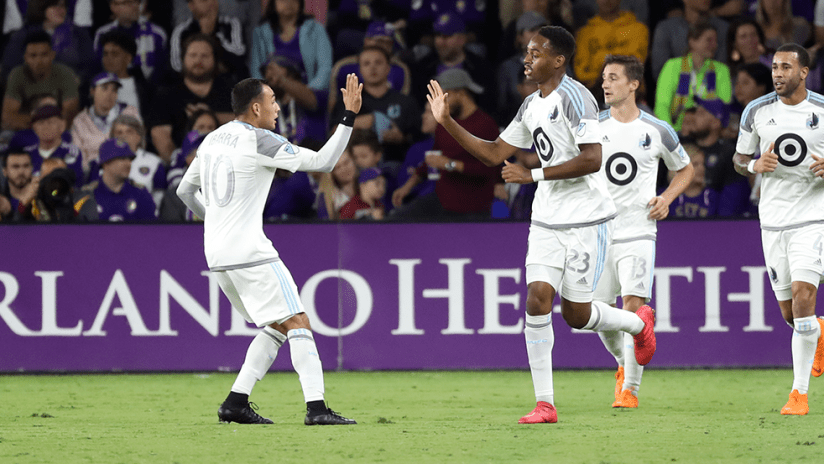In the 130-plus minutes since Minnesota United midfielder Kevin Molino went down in the 50th minute of the Loons’ game against Orlando City on March 10, Minnesota have accumulated a plus-2 goal differential and all six possible points. That's perhaps a better return than you could expect after a team loses its best attacking player. Yet it’s not entirely illogical.
In 2011, my FC Dallas team lost 2010 MLS MVP David Ferreira for the season; he broke his ankle in the sixth game of the year. Most thought we were dead and buried, but we went on to win 8 of our next 12 games, only losing twice in the 17 games after Ferreira went down.
Two things kept us from being crushed:
First, other players felt empowered. Everyone else gains an opportunity to take on more responsibility. You never really know how good a player is until you give him a chance, and when we had Ferreira, the game plan was “Get the MVP the ball.” When we didn’t have Ferreira on the field, Eric Alexander was asked to do more, Brek Shea was asked to do more, Fabian Castillo was asked to do more, and … it turned out they were all pretty good! Each played better without our MVP on the field.
It’s not say Ferreira held any of us back, or Molino did on this year's Loons, but when players are given a chance to do more – or something different – sometimes they step up and all of a sudden you have six players outperforming their previous selves.
Second, losing a cornerstone forces teams to critcally think about their style and identity. Sometimes a great attacking player can be a crutch. As we did with Ferreira, players and coaches sometimes think, “Oh, we can just get him the ball because he can bail us out.” Without that special teammate, you have to plan more thoroughly. You need a clear approach and sense of how you intend to win games.
The Loons appear to have already redefined themselves. Head coach Adrian Heath picked Miguel Ibarra to replace Molino as the center attacking midfielder. Ibarra, unable to replicate Molino’s attacking prowess, took a different approach: He acted as more of an industrious, shuttling midfielder than a true playmaker, an approach that seemed to fit both the team and the player.
As noted by Bruce McGuire, editor of Minnesota United blog du Nord, Ibarra’s best years for the Loons -- the ones that got him called into US national team camps -- came as a hybrid, hustling midfielder rather than a pure attacking player.
It was only after Jurgen Klinsmann switched Ibarra outside for the national team that a perception of him as a winger rather than a central player began to take hold. When Molino went down, many (including, well … me) thought Heath would have to play a natural wide player out of position to fill the central role. In reality, Heath had a suitable player all along.
It’s not just observers from the outside who noticed the contribution from Ibarra’s performance, either. Adrian Heath praised Ibarra’s work rate after Saturday's game: “I thought his effort was incredible today. If it would have been a grass pitch he would have covered every blade of it.” Ibarra, too, felt confident in his approach, saying “I'm always going to bring energy. I'm going to bring a lot of pressure.”
Not by coincidence, Minnesota earned their two victories through solid defending, limiting opponent’s chances, and being efficient on the counter.
I’m not going to sit here and proclaim Minnesota will win MLS Cup. Neither of their conquests, Orlando nor the Chicago Fire, seem to knocking on the door to Eastern Conference Championship contention. But I predicted Minnesota to finish in the bottom few places entering the season and I no longer feel confident in that. They seem to be cementing a clear ethos and style, and with improved performances from key players. Those are pretty important ingredients for success. (I hope none of this comes as a knock to Kevin Molino, who was in fantastic form; it simply shows the dynamic nature of team building.)
Minnesota have a tough choice ahead. Rumors suggest a deal with Colombian attacker Darwin Quintero is close to done. Does adding a new focal point damage what they’ve been building? Is it possible to take what they’ve established over the last two games and insert a new great player into the framework? Or are these two wins but a fluke, and Minnesota simply need more talent to compete?
It’s a strange dilemma for their fans. Minnesota are on the verge of acquiring the big name they’ve been craving, and it’s at the exact moment the pieces seem to be coming together without one.













